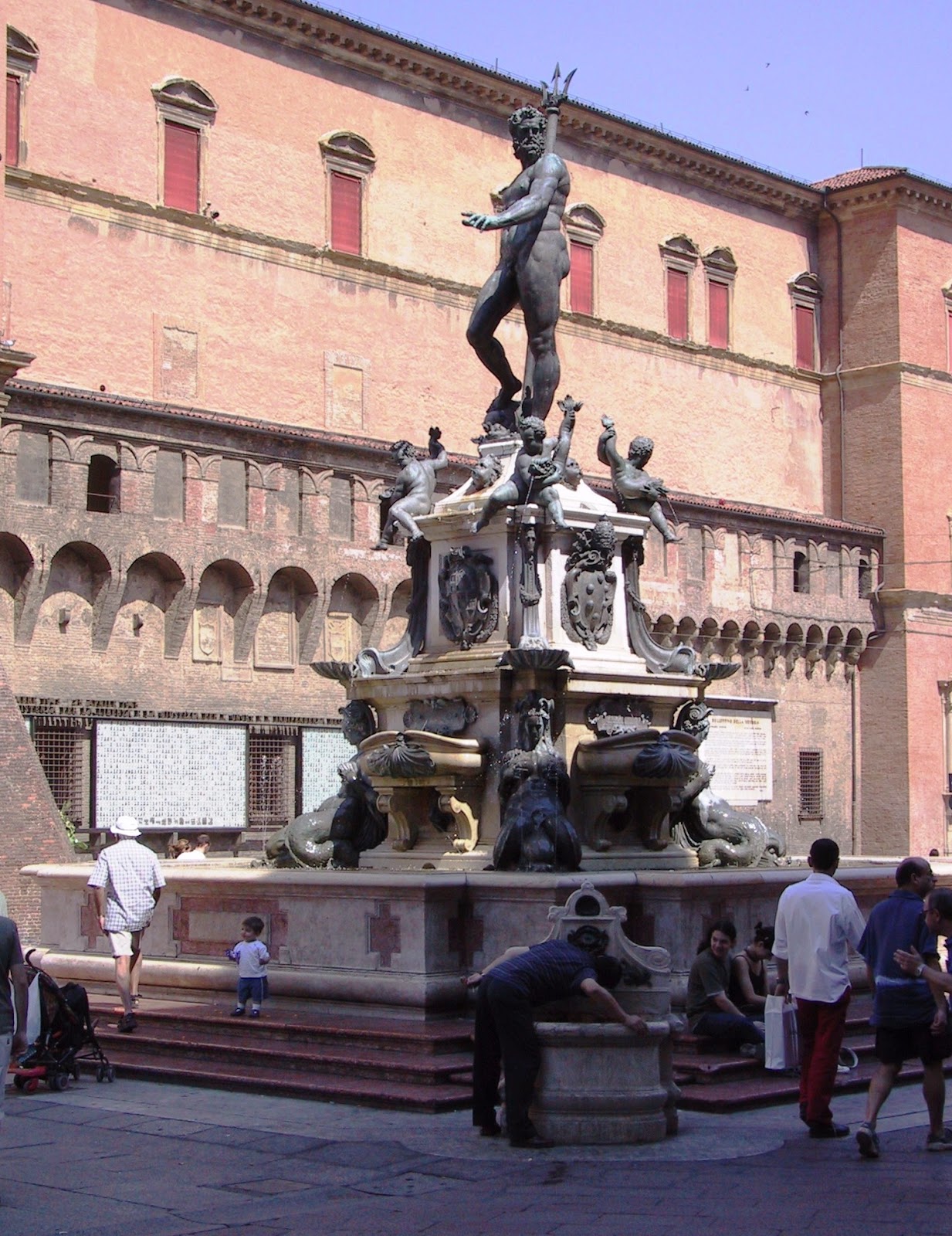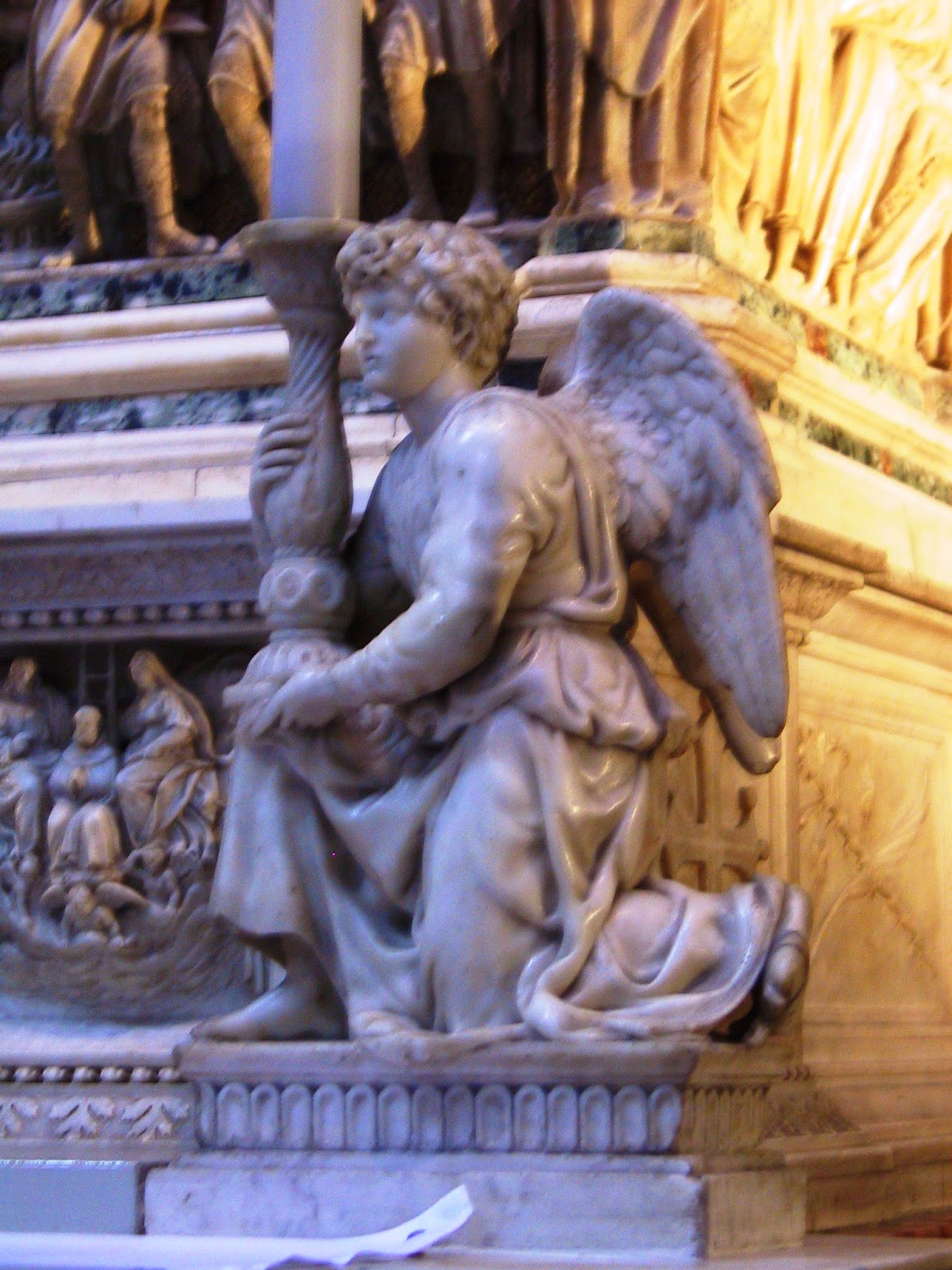Saturday, June 23, 2001 -- Bologna to Padua:
On Saturday morning, we met Luca at the café in the Piazza
Maggiore for coffee and then a quick tour of central Bologna.
 |
| 'Fountain of Neptune' in Piazza Maggiore, Bologna, by Giambologna, 1565. Photo by Blomme-McClure |
We visited the Basilica of San Petronio which has wonderful sculptural elements on the incomplete facade by Jacopo della Quercia (1425 to 1434).
 |
The unfinished facade of the Basilica of San Petronio in Bologna. The basilica was a project of the city of
Bologna, not the Roman Catholic Church. It was constructed between 1390 and 1514 when it was halted
by Pope Pius IV who was worried that it would be more grand than the St. Peter's basilica in Rome.
Photo by Blomme-McClure |
 |
Porta Magna (main doorway) with sculpture by Jacopo della Quercia.
Photo by Blomme-McClure |
 |
| Bas relief on Porta Magna shows three scenes from Genesis: (from the top) 'The Creation of Eve from Adam's Rib'; 'The Temptation of Adam'; and 'The Expulsion from the Garden of Eden' all by Jacopo della Quercia. Photo by Blomme-McClure |
 |
'The Virgin and Child with Saints Petronius and Ambrose' above the central doorway by Jacopo della Quercia. The relief panels show New Testament scenes including 'Adoration of the Shepherds';
'Adoration of the Magi'; 'Nativity'; and 'Massacre of the Innocents'. Photo by Blomme-McClure |
 |
Porte Minore di Sinistra, to the left of the main door. The lunette shows Christ rising from
the tomb while two of the three Roman soldiers sleep. Photo by Blomme-McClure |
 |
| Nave of Basilica of San Petronio. Photo by Blomme-McClure |
Luca pointed out that the south side of the
basilica had been noted by Frank Lloyd Wright as early example of “organic”
architecture.
 |
South facade of Basilica of San Petronio, commended by Frank Lloyd Wright.
Photo by Blomme-McClure |
 |
| Cloister of Basilica of San Domenico, Bologna. Photo by Blomme-McClure |
 |
| Choir and Apse of Basilica of San Dominico seen from Cloisters. Photo by Blomme-McClure |
Luca also took us into the courtyard of the old University of Bologna where the walls and ceilings are encrusted with the coats of arms of former students and intellectual societies.
 |
A courtyard of the University of Bologna which was founded in 1088.
Photo by Blomme-McClure |
 |
Arcade ceiling with the coats of arms of famous students of the University of Bologna.
Photo by Blomme-McClure |
 |
Statue of Louis Galvani, the noted Italian anatomist in Piazza Galvani.
Photo by Blomme-McClure |
After our tour, we said 'good-bye' to Luca, returned to the Baglioni to retrieve our
luggage and the car for our drive to Padua – about an hour away.
Padua is unprepossessing at best – a medium-size city
of no special charm for us. Perhaps it
was our hotel, the Grand’ Italia Hotel (Corso del Popolo 81, Padova, 049
8761111, http://www.hotelgranditalia.it/)
which sits above a McDonalds on a plaza where the railroad station meets the
regional bus network. It is about a
15-minute walk through a rather drab area to the old part of the city and about
a 30-minute walk to the city’s main attraction, the Basilica of St.
Anthony. That evening we had dinner at
Ristorante Belle Parti (Via Belle Parti 11, Padova, 049/8751822) near the old
vegetable market (Piazza delle Erbe) on the south side of an old dump called
the Palazzo Raggione. There is a fruit
market (Piazza della Frutta) on the north side of the same building. Belle Parti is a very nice, traditional
restaurant with a huge Parma ham sitting in the middle of an antipasta
table. The food and service were good,
if unmemorable.




















No comments:
Post a Comment